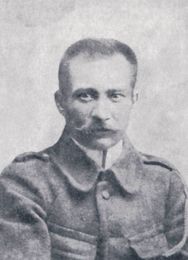“I suffer a terrible misery, but I will not betray, and I prefer to die”. Those words were scratched in his prison cell before his death by Lieutenant Stanisław Kaszubski, a.k.a. “King” (1880-1915), a soldier of the 1st Brigade of the Polish Legions. At the moment of his death on the gallows on the market square in Pilsen, he managed to shout: “Poland is not yet lost”.
Stanisław Kaszubski was born on 3 October 1880 in Warsaw. His father Franciszek was a January Uprising insurgent and later a mathematics teacher, while his mother Kazimiera (née Krzykowska) raised three children. Due to his patriotic efforts, the young Stanisław was expelled by the Russian authorities from schools in Warsaw, Płock and Vilnius, and only managed to pass his matriculation exam in Theodosia in the Crimea in 1906.
Arrested and sentenced in 1905 initially to exile to Arkhangelsk, he later was expelled from Russia. He settled in Kraków, where he began studying medicine at the Jagiellonian University and joined the Riflemen’s Association. Through the organisation he was sent to an instructor’s school in Stróża in August 1913.
After the outbreak of the First World War, he joined the First Brigade of the Legions, where he served as a platoon commander in the 1st Regiment. During the Battle of Łowczówek on 25 December 1914, he was taken prisoner by the Russians. As he was a Russian citizen, he was sentenced to death by the court. Before its execution, he refused to join the Russian army as a condition for being spared his life. He was hanged at Pilsen on 7 February 1915 and was subsequently buried in an unnamed grave. In November 1915, after the Austrian army occupied Pilsen, Kaszubski’s body was exhumed and ceremonially buried.
He was posthumously awarded the Virtuti Militari Cross and the Cross of Independence. In 1923, a monument to Stanisław Kaszubski was erected in the cemetery in Pilsen on the initiative of the Sokol Gymnastic Society.





